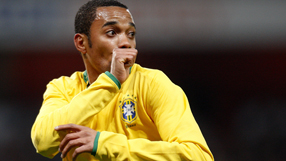
The Manchester City forward mesmerised the Italians at London's Emirates stadium with an array of shimmies, flicks and trademark stepovers.
Brazilian supporters, however, may wish that he had saved some of them for a much more important game next month.
Brazil make the long journey to Quito to face Ecuador on March 28 at 2,800 metres above sea level in a World Cup qualifier.
The combination of difficult, physical opponents and high altitude makes this one of the most difficult fixtures of Brazil's 18-match qualifying campaign and they have lost 1-0 on their previous two visits to Quito in 2001 and 2004.
It is exactly the sort of game in which Brazil need Robinho's trickery the most and in which, so far, he has struggled to provide it.
Robinho's goal against Italy was his 19th for Brazil in 59 appearances, several coming in friendlies against modest opponents such as Hong Kong, Canada and a Kuwait Select team.
He scored six times in the Copa America in 2007, including four in two games against a Chilean side in disarray, but none were in the semi-final or final.
The best features, fun and footballing quizzes, straight to your inbox every week.
DEMANDING CIRCUMSTANCES
In the current World Cup qualifying campaign, he has managed three goals, two against a defensive weak Venezuelan team in October and one away to Chile in August, one of the few times he has shone in more demanding circumstances.
However, he barely made an impression in the 2-0 defeat in Paraguay and goalless draws against Argentina, Colombia and Bolivia in which Brazil badly needed his creative skills to break down uncompromising defences.
Brazil coach Dunga, in typically dour mood, preferred to praise his players for their tactical discipline against Italy rather than their individual inspiration.
"We have to have tactical obedience and marking and when we can have possession of the ball, we can enjoy ourselves," he told the Brazilian federation's website.
"We showed that Brazilian players are tactically disciplined.
"The old story that Brazilian players are indisciplined and don't mark, that they don't chase back belongs in the past.
"All of our the players were looking to mark their opponents."
 Join The Club
Join The Club





